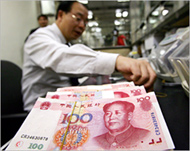Greenspan calls for flexible yuan
US Federal Reserve Chairman Alan Greenspan has urged a more flexible exchange rate for the Chinese currency.

“The issue of allowing flexibility in some form in the RMB (renminbi, also known as the yuan), strikes me as very much to the advantage of China and indeed it’s something that I am certain they’ll take on reasonably soon,” he told a Beijing banking conference on Tuesday.
At the same time, he said via satellite from the United States, the American economy was unlikely to see major benefits if China adopted a more flexible system for determining the value of its currency.
“In the event the RMB rises relative to the US dollar, the United States will likely import less goods from China but that does not mean that our current account deficit or our trade deficit will shrink very much, if at all.”
 |
|
China has been criticised by its |
Goods from China would simply be displaced by goods from “other, only slightly lesser low cost sources of materials,” he said.
“It surely is not going to be a major impact on the net balance of payments structure of the United States,” he said.
More time
Contradicting Greenspan’s belief that it might act soon, Chinese Central Bank Governor Zhou Xiaochuan told the conference that the country needed time to bring about greater currency flexibility.
“We will push forward the reforms step by step. Past experience has told us that gradual reform is successful,” he said.
“If there are too many expectations of the role of the RMB, it’s too heavy a burden on our shoulders,” said Zhou, addressing the idea a Chinese currency appreciation would be a panacea for solving the world’s economic woes.
|
“China needs to prepare exchange rate reform in several ways. We must reform financial institutions to prepare for the future environment of exchange rate flexibility” Zhou Xiaochuan, |
He said the main reason why China was taking its time introducing flexibility in its foreign exchange system was because there was so much to prepare.
“China needs to prepare exchange rate reform in several ways. We must reform financial institutions to prepare for the future environment of exchange rate flexibility,” Zhou said.
“We must improve the foreign exchange market allowing financial institutions and the corporate sector to use the market to hedge exchange rate risk.”
Extra investment
China has never given a timetable for such a move and insists it will not be forced into one.
One of the effects of the ongoing delay has been that it has pushed the Central Bank into aggressive mopping up operations to soak up the extra investment money flows betting on a yuan revaluation that have entered the banking system.
In part the inflows are being blamed for triggering overheating in an already fast growing economy.
Greenspan said the cost of this sterilisation exercise, aimed at reducing the impact of such foreign fund inflows on China‘s domestic money supply, cannot go on forever.
“The sterilisation of foreign assets cannot go on indefinitely and the pegging of the exchange rate and the way it is being done subsidises certain types of inefficient capital allocation in the Chinese economy,” he said.